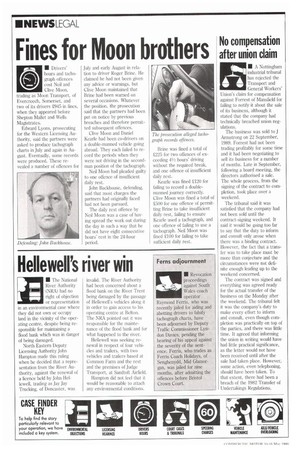Fines for Moon brother, No compensation
Page 30

If you've noticed an error in this article please click here to report it so we can fix it.
3 after union claim
• Drivers' hours and tachograph offences cost Neil and Clive Moon, trading as Moon Transport, of Evercreech. Somerset, and two of its drivers 945 in fines, when they appeared before Shepton Mallet and Wells Magistrates.
Edward Lyons, prosecuting for the Western Licensing Authority, said the partners were asked to produce tachograph charts in July and again in August. Eventually, some records were produced. These revealed a number of offences for July and early August in relation to driver Roger Brine. He claimed he had not been given any advice or warnings, but Clive Moon maintained that Brine had been warned on several occasions. Whatever the position, the prosecution said that the partners had been put on notice by previous breaches and therefore permitted subsequent offences.
Clive Moon and Daniel Kearle had been co-drivers on a double-manned vehicle going abroad. They each failed to record the periods when they were not driving in the secondman position of the tachograph.
Neil Moon had pleaded guilty to one offence of insufficient daily rest.
John Backhouse, defending, said that most charges the partners had originally faced had not been pursued.
The daily rest offence by Neil Moon was a case of having spread the work out during the day in such a way that he did not have eight consecutive hours' rest in the 24-hour period. Brine was fmed a total of £225 for two offences of exceeding 41/2 hours' driving without the required break, and one offence of insufficient daily rest.
Kearle was fined 220 for failing to record a doublemanned journey correctly. Clive Moon was fined a total of £500 for one offence of permitting Brine to take insufficient daily rest, failing to ensure Kearle used a tachograph, and one offence of failing to use a tachograph. Neil Moon was fined £100 for failing to take sufficient daily rest.
• A Nottingham industrial tribunal has rejected the Transport and General Workers' Union's claim for compensation against Forrest of Mansfield for failing to notify it about the sale of its business, although it stated that the company had technically breached union regulations.
The business was sold to J Armstrong on 22 September, 1989. Forrest had not been trading profitably for some time and it had been negotiating to sell its business for a number of months. Late in September, following a board meeting, the directors authorised a sale. The whole process, from the signing of the contract to completion, took place over a weekend.
The tribunal said it was satisfied that the company had not been sold until the contract-signing weekend. It said it would be going too far to say that the duty to inform and consult only arose when there was a binding contract. However, the fact that a transfer was to take place must be more than conjecture and the circumstances were not definite enough leading up to the weekend concerned.
The contract was signed and everything was agreed ready for the actual transfer of the business on the Monday after the weekend. The tribunal felt it was the company's duty to make every effort to inform and consult, even though completion was practically on top of the parties, and there was little time. It agreed that informing the union in writing would have had little practical significance, as the letter would not have been received until after the sale had taken place. However, some action, even telephoning, should have been taken. To that extent, there had been a breach of the 1982 Transfer of Undertakings Regulations.
























































































































